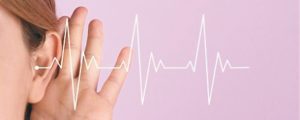By Dr. Noël Crosby, Au.D.
 The Center for Disease Control supports Better Hearing and Speech Month, founded in 1927 by the American Speech-Language-Hearing Association. Each May, this annual event provides an opportunity to raise awareness about hearing and speech problems, and to encourage people to think about their own hearing and get their hearing checked.
The Center for Disease Control supports Better Hearing and Speech Month, founded in 1927 by the American Speech-Language-Hearing Association. Each May, this annual event provides an opportunity to raise awareness about hearing and speech problems, and to encourage people to think about their own hearing and get their hearing checked.
Early identification and intervention for hearing loss is important. Many people live with unidentified hearing loss, often failing to realize that they are missing certain sounds and words. Checking one’s hearing is the first step toward addressing the issue. Protect your hearing! And if you already have hearing loss or are experiencing pain, discomfort, or ringing in the ears, take steps to keep it from getting worse.
According to the World Health Organization’s first World Report on Hearing, noise is now being acknowledged as an important public health issue and a top environmental risk faced by the world today. Over 50% of people aged 12–35 years listen to music via personal audio devices at volumes that pose a risk to their hearing. A rule of the thumb for staying safe is to keep the volume below 60%.
If you frequently use personal audio devices around loud sounds: instead of turning the volume up, consider using noise cancelling earphones or headphones. Listening through personal audio devices should not exceed 80 dB (adults) or 75 dB (sensitive users: e.g., children) for 40 hours a week. Listeners who regularly use portable audio devices can expose themselves to the same level of sound in 15 minutes of music at 100 dB that an industrial worker would receive in an 8-hour day at 85 dB.
Did you know the average person is born with about 16,000 hair cells within their inner ear. These cells allow your brain to detect sounds. By the time you notice hearing loss, many hair cells have already been damaged or destroyed. You can lose 30% to 50% of hair cells before changes in your hearing can be measured by a hearing test. Damaged inner ear cells do not grow back. In addition to damaging hair cells, noise can also damage the auditory nerve that carries information about sounds to your brain. Early damage may not show up on your hearing test.
Although there is no treatment to restore normal hearing, you can prevent hearing loss from loud sounds. Protect your hearing! And if you already have hearing loss or are experiencing pain, discomfort, or ringing in the ears, take steps to keep it from getting worse. Get your hearing checked. Loud noises can cause hearing loss, but you can take steps to protect your ears.
How does one protect themselves from hearing loss?
People often voluntarily expose themselves to loud sounds through their headphones or through the stereo system in concerts, nightclubs, sporting events, and even fitness classes. Protect your hearing when shooting a firearm. Those using firearms for recreational purpose would benefit from learning about their safe use, which includes but is not limited to use of hearing protection. Is the noise too loud? If you need to shout to make yourself heard, then yes. And you need hearing protection such as earplugs or noise-cancelling earmuffs. Do not listen to headphones for a long time. Turn the volume down and take periodic breaks from the noise.
Advanced Hearing Solutions
Using the latest and most sophisticated technology, we determine if you have hearing loss–and, if you do, we determine the degree and type of hearing loss. If your hearing loss requires medical or surgical intervention, we can refer you to a physician (otologist or neurologist) for appropriate treatment. If your type of hearing loss can best be treated with the use of hearing aids and/or other assistive listening devices (which is true in the great majority of cases), we can select any of a wide range of hearing devices and custom fit them to your ear, programmed to augment your hearing at those frequency levels where your hearing loss is greatest.
Call Advanced Hearing Solutions today at (941) 474-8393.









